Put your growth on autopilot
GrowSurf is modern referral program software that helps product and marketing teams launch an in-product customer referral program in days, not weeks. Start your free trial today.
Imagine marketing to customers without making them feel they are being marketed to--that's the power of socially responsible marketing when it is done right. But what drives companies to engage in socially responsible marketing? According to a 2017 study by Cone Communications, 87% of consumers will purchase a product or service because a company advocated for an issue they cared about. This highlights the potential business benefits of taking a socially conscious approach to marketing.
We have one word for you: Purpose. Socially responsible marketing connects a brand's purpose and values to their products and messaging in an authentic way. According to Deloitte's 2021 Global Marketing Trends report:
"Purpose-driven companies inherently understand why they exist and who they are built to serve--from their customers and workforces to the community--regardless of what they sell." Brands that can clearly articulate and live up to a meaningful purpose tend to build deeper connections with consumers and earn their loyalty.
In fact, their report suggests that a staggering 79% of customers remember brands that positively responded to COVID-19 to help their customers, workforces, and communities. This demonstrates how socially responsible actions during times of crisis can leave a lasting positive impression on consumers. Brands like TOMS donated a portion of profits to organizations supporting communities impacted by the pandemic, building goodwill.
In simpler words, purpose-led marketing that authentically connects a brand's mission to societal impact can boost brand loyalty, awareness, and recognition - providing an important competitive advantage. However, it's crucial that brands avoid the perception of greenwashing or inauthentic claims. As noted by the Holy Cross study on greenwashing, "65% of consumers say they'll research a company's stand on an issue, to see if it's being honest." Brands must back up their socially responsible marketing with real, measurable actions.
In this comprehensive guide, we will look at why socially responsible marketing should be every brand's guiding philosophy, pandemic or not. We'll explore the key benefits like increased brand loyalty, awareness, and sales. Plus, we will also look at how you can authentically drive a socially responsible marketing campaign that resonates with consumers by:
Let's jump right in.
One of the most tangible benefits of socially responsible marketing is the potential to increase sales and overall profits for the company. As per the Business of Sustainability Index, 64% of customers are willing to pay more for sustainable products. Additionally, research by Nielsen found that 66% of consumers were willing to pay premium prices for goods from brands that demonstrate social commitment.
The outdoor clothing brand, Patagonia, is an excellent case in point. The brand has been recognized as a " UN Champion of the Earth, receiving the UN's top environmental honor for a dynamic mix of policies that have put sustainability at the heart of its successful business model." For example, the brand encourages its customers to volunteer for a variety of projects and demonstrate their skills for a grassroots environmental group:

However, brands need to think creatively when it comes to building an authentic social connection with their target market. They must clearly demonstrate their genuine, long-term commitment to sustainable causes through transparency and education. As the Business of Sustainability Index found, around 74% of customers claim they don't know how to identify truly sustainable brands. Providing clear information on sourcing, manufacturing processes, and environmental impact can help build trust.
The Takeaway: Businesses need to instill trust and loyalty among customers by clearly demonstrating their commitment to sustainable goals through transparency and measurable actions - not just marketing claims. Doing so can empower the brand to justify premium pricing for eco-friendly offerings, add real value to customers' lives, and boost investor confidence. As the Aflac Corporate Social Responsibility Survey found, 73% of investors say a company's environmental and social efforts impact their investment decisions. Ultimately, authentic socially responsible practices can raise a business's overall value.
Openly supporting noteworthy social or environmental causes is an effective brand-building strategy. It allows customers to form an emotional connection with brands that share their values, driving long-term customer loyalty and advocacy. As noted in Cone Communications' 2017 CSR Study, "79% of consumers are motivated to purchase from companies committed to making the world a better place." When done authentically, socially responsible marketing can foster powerful brand evangelism.
Moreover, socially responsible marketing can boost brand visibility and appeal among previously untapped customer segments, helping brands expand their reach. For example, research by Deloitte found that millennials are highly attracted to companies with strong purpose and values beyond just profits. By aligning with social and environmental causes, brands can connect with this influential demographic.
Take Glossier's campaign, for instance, which openly and actively supported the sensitive issue of #BlackLivesMatter:
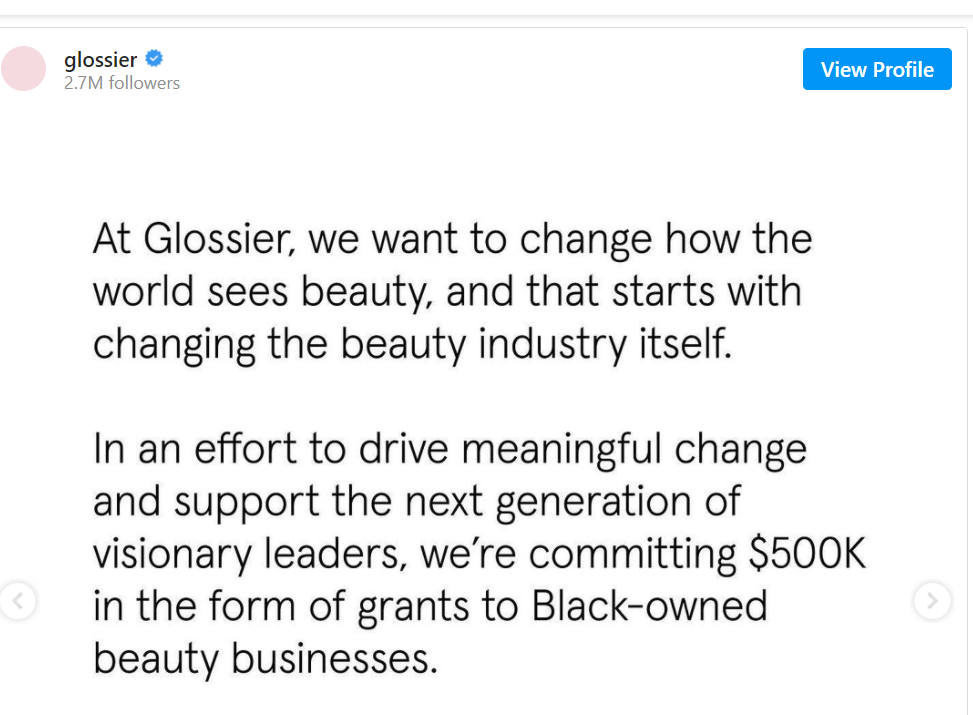
Moreover, the brand announced how they planned to fund $500,000 in grant money to black-owned beauty businesses on social media and was working towards providing $500,000 in donations to organizations fighting racial injustice.
This is in stark contrast to how Starbucks initially denied employees from wearing t-shirts and pins that supported the #BlackLivesMatter movement, and faced significant backlash. The brand, later on, had to reverse its stand and announce its support on Twitter:
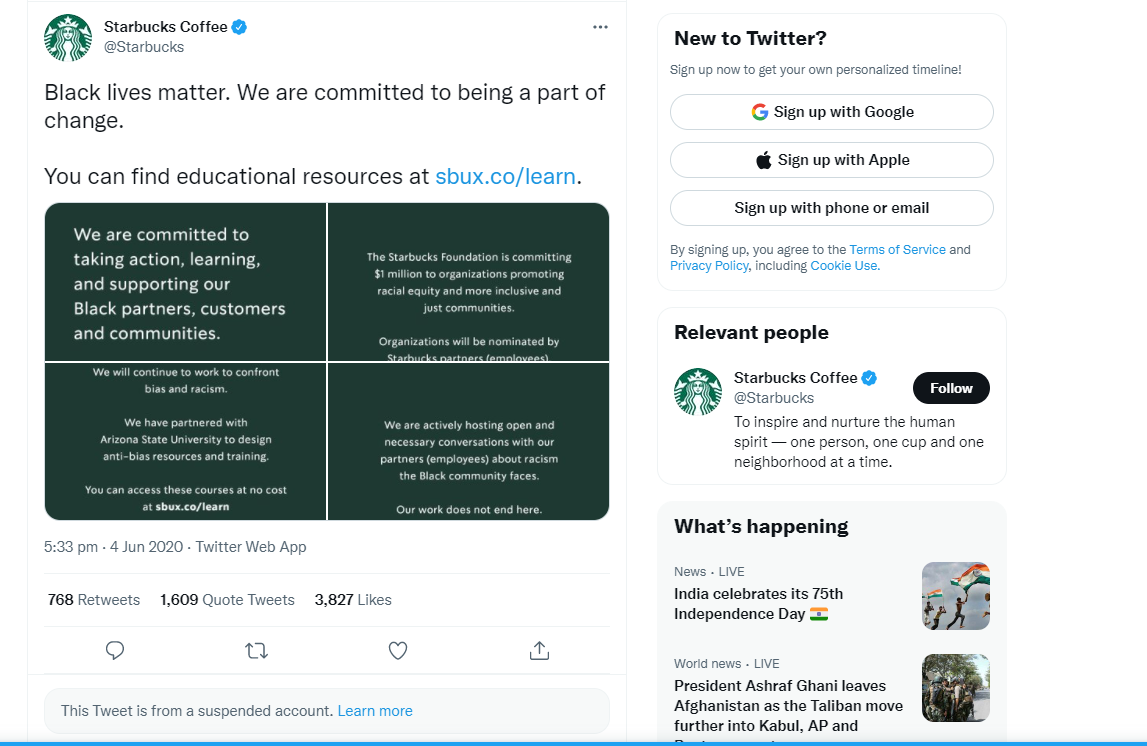
The Takeaway: Taking a stand, making social contributions, and driving a socially sustainable business model finds many takers in today's market. Research suggests that " 79% of consumers are motivated to purchase from companies committed to making the world a better place, while 73% of investors state that efforts to improve the environment and society contribute to their investment decisions."
As the NTT Data found, 92% of employees who work at a company with a strong sense of purpose say they would recommend their employer. By taking a stand on important issues through socially responsible marketing, brands can differentiate themselves from competitors and become an employer of choice for top talent.
Additionally, as sustainability becomes a greater priority for consumers, brands proactively addressing environmental and social issues can get ahead of future regulations and market shifts. This allows them to build reputational advantages over slower-moving competitors.
The Takeaway: Socially responsible marketing is not just about ethics - it provides tangible competitive advantages. As the Aflac CSR Survey indicates, 41% of millennial investors closely evaluate a company's social responsibility practices before investing. By proactively showcasing their positive impact through marketing campaigns and branding, companies can gain an edge in attracting conscious consumers, investors, and top talent.
Socially responsible marketing initiatives don't just impact customers - they can also significantly boost employee morale, engagement, and retention. According to Harvard Business School, nearly 70% of employees say they would not work for a company without a defined purpose beyond just profits.
By rallying employees around meaningful social or environmental causes, companies can foster a stronger sense of pride, motivation, and loyalty in their workforce. This can lead to higher productivity, reduced turnover, and an easier time attracting top talent aligned with the company's values.
The Takeaway: Sponsoring socially responsible initiatives and giving employees opportunities to contribute is crucial for driving pride, loyalty, motivation, and a sense of shared purpose within the workforce. As the NTT Data shows, companies with a strong social purpose see higher employee engagement, productivity, retention, and likelihood of recommendations to others seeking employment. Socially responsible marketing is an investment in a company's culture and human capital.
The data echoes the same sentiment claiming that 92% of employees who work at a company with a strong sense of purpose say they would be more likely to recommend their employer to those in their network who are looking for a job.
Sign up for a free trial of GrowSurf to lower your customer acquisition costs, increase customer loyalty, and save gobs of time.

Companies that demonstrate a genuine, long-term commitment to socially responsible practices through measurable actions and transparency are more likely to attract investor interest. As the Aflac CSR Survey found, 73% of investors say a company's environmental and social impact influences their investment decisions.
Additionally, socially responsible brands may qualify for government grants, tax reliefs, or other incentives tied to sustainability initiatives in areas like renewable energy, ethical supply chains, or community development programs. This can provide further financial benefits on top of the reputational advantages.
The Takeaway: Authentic socially responsible practices, backed by measurable actions and transparency, can drive growth by attracting investors focused on environmental and social impact. It can also open doors to financial incentives from governments supporting sustainability initiatives. However, the most important benefits may be the intangible ones - building motivation, loyalty, and a positive reputation among employees, customers, and communities.
In the next section, we will look at some proven socially responsible marketing strategies that you can embrace.
COVID-19 has upended your customers' lives in unimaginable ways. This is where socially responsible marketing can truly make an impact. It can help position the brand in a 'good light,' ensuring that people remember the random acts of kindness the brand portrayed when the tough got going.
There are numerous ways to showcase your brand in a positive and powerful capacity:
By celebrating and cherishing your customers for staying with your brand through thick-and-thin: Cadbury's refreshing take, #SayThankYou, involved a full-page advertisement where customers could fill in their personalized Thank You--for every unnoticed individual who makes their lives easier:

Image Source: CampaignBriefAsia
Moreover, the brand partnered with an NGO called Nirmana to sponsor over 17,000 daily wagers and help them. This is a classic example of feel-good content and socially responsible marketing at its best.
By offering services to users free-of-cost: A number of brands, particularly the mental health and physical fitness apps, made their offerings (or at least a part of it) free to help users who were struggling with the challenges that COVID poses. Headspace is one such app:

Image Source: Headspace
By investing in the right customer service tools: For instance, think about how your brand is going to help customers in their time of need. As a tried-and-tested solution, you can add thelive chat support software. Live chat is one of the most effective customer support channels today to improve the quality of customer experience.
Take a look at Lululemon's live chat functionality which empowers customers to connect with the brand instantly:
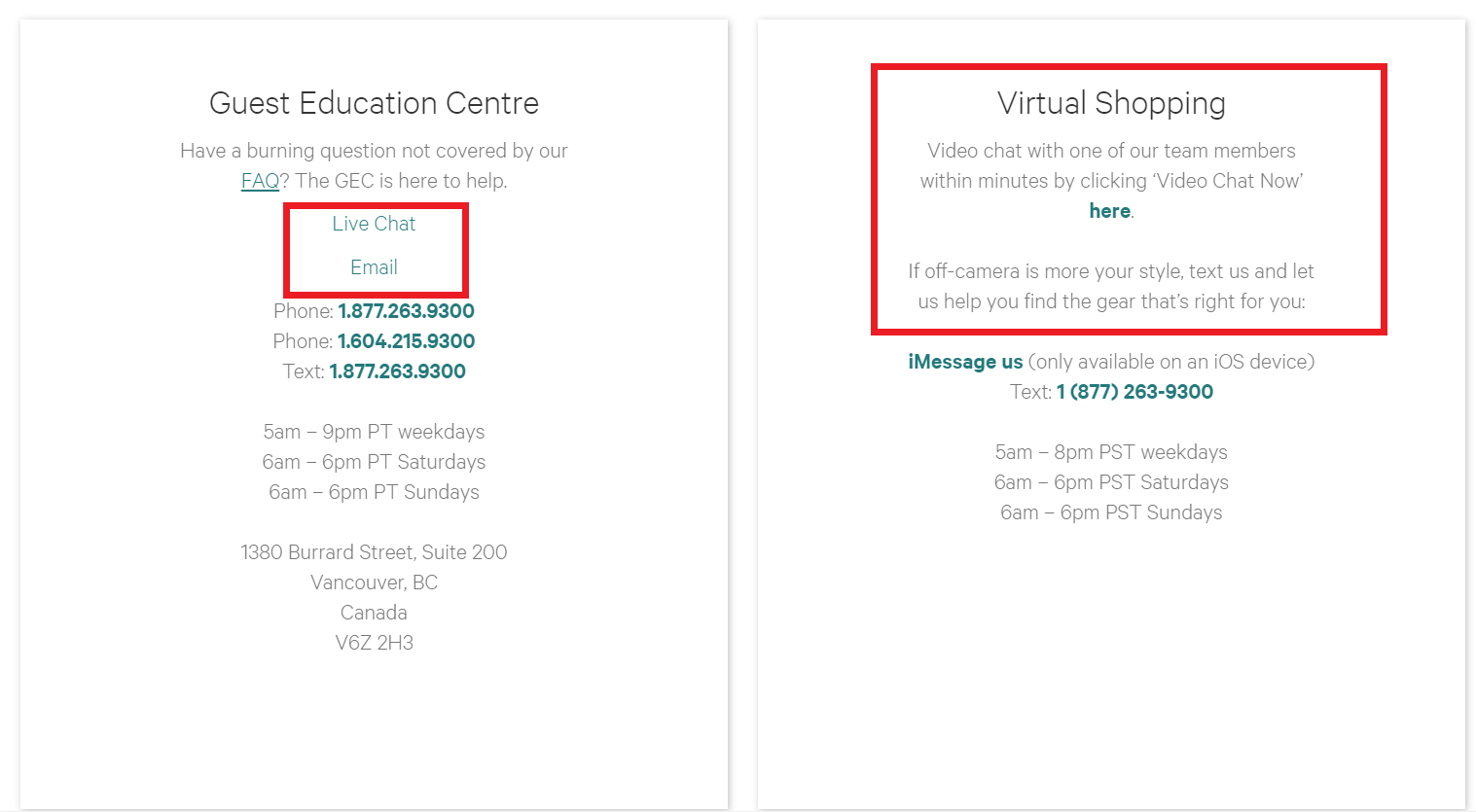
Users can get all their queries addressed at the click of a button, without having to wait or hold at all. This kind of speedy and efficient service is what customers need, especially when everyone is in the thick of a global pandemic.
As per a Cone study, 65% of the participants claimed that they will research a company's stand on an issue, to see if it's being honest or not. So if you think that you can get away with marketing gimmicks and one-off social campaigns, think again.
For inspiration, look at SAP's Qualtrics Remote Work Pulse platform, which offers indispensable advice on how companies can transition into new ways of remote working:
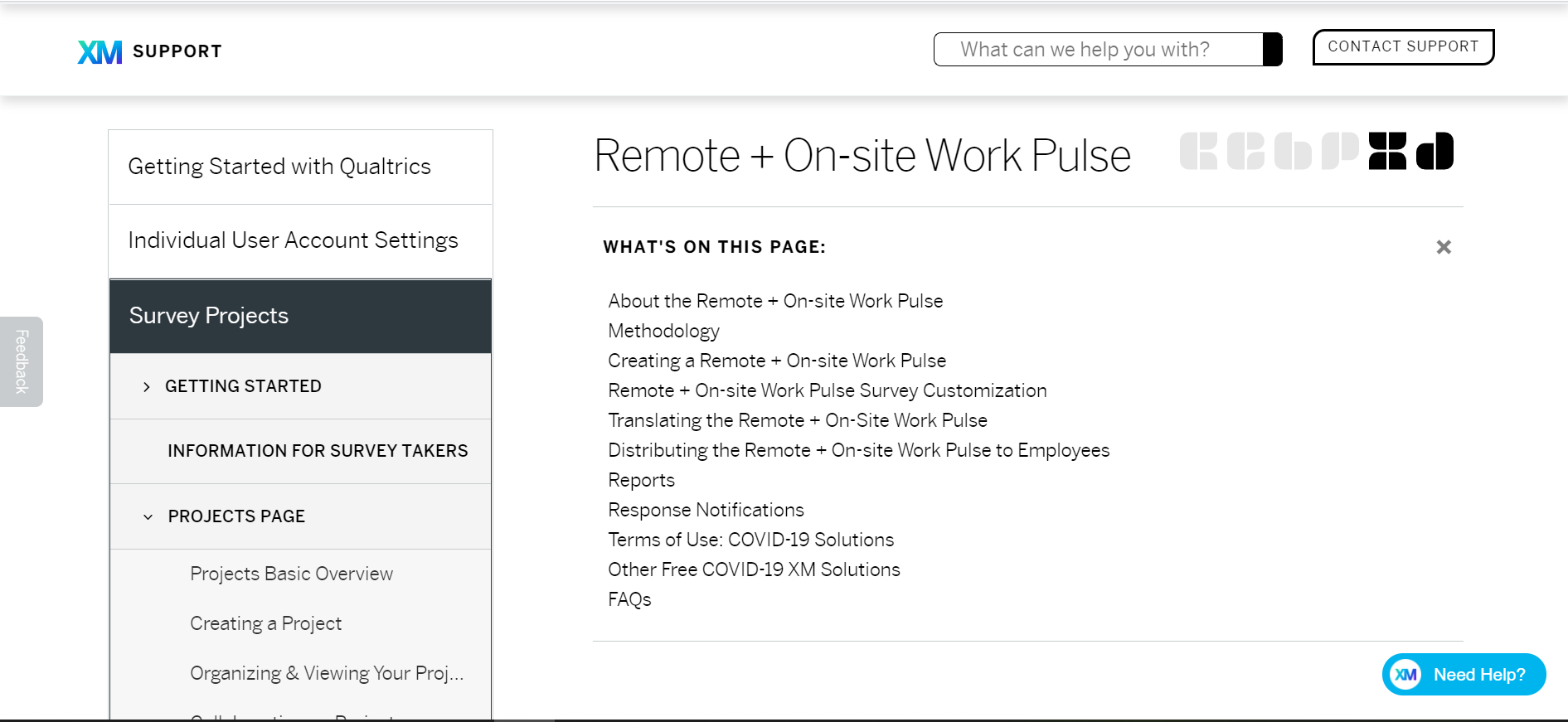
Image Source: Qualtrics
This kind of authentic, value-driven offering, one that's marked with empathy and transparency, can organically place your brand into the customer's good books.
Lifebuoy's 'hands-on' approach to spread hygiene awareness during COVID is an excellent example to consider. The brand rolled out a heart-touching and honest public service campaign by requesting people to maintain hand hygiene irrespective of the product they choose to wash their hands with:
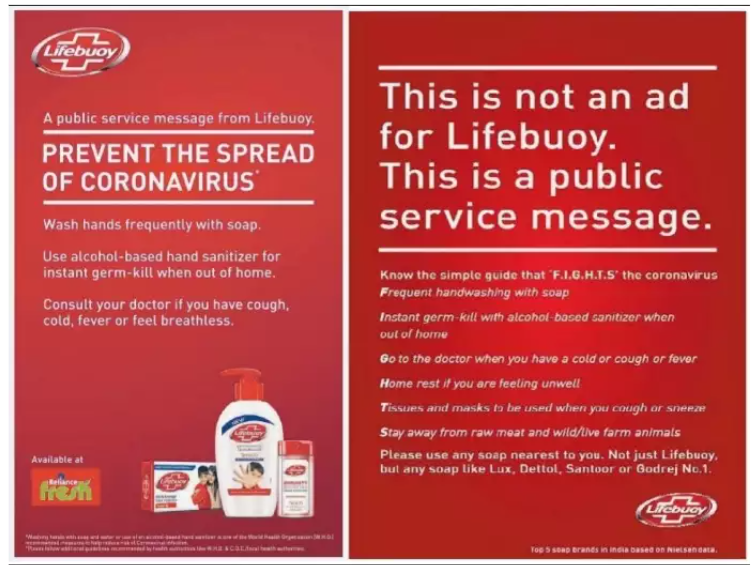
Image Source: India Times
No points for guessing whether the ad makes an indelible mark on the customers or not.
Long story short, stay away from in-your-face commercial advertisements that can do more harm than good. For instance, marketing your brand's clothing as "virus-free" material can have a negative impact on the customer's mindset as it is clearly impossible and untrue.
Or take the example of Kent's disastrous campaign, which was unabashedly classist in approach and discouraged customers from allowing domestic help to enter the home. Instead, the brand highlighted its own 'dough maker as the perfect solution, leading to an outpour of trolls on social media channels (understandably so):

Image Source: Scroll.in
As you can imagine, the brand had to withdraw the advertisement but sadly, the damage was already done.
Customers want to be emotionally connected to brands. They want to see meaningful, purposeful, timely, and relevant campaigns from brands, and 55% want brands to take a stand on key social, environmental, and political issues.
So if your brand is making it the one-point agenda to support--and drive--social causes, ensure that the messaging is not coming across as 'tone-deaf.' In simpler words, you need to revisit your brand's messaging tone and voice to ensure that it sounds more humane, empathic as opposed to being corporate-like and robot-sounding.
Take a look at the Harvard Business Review's example:

Image Source: Harvard Business Review
To add value to their reader base's life and boost positive branding, the brand delivers numerous Coronavirus-related articles free of cost. Small-yet-significant socially relevant marketing steps like these can create a ripple effect and drive positive word-of-mouth publicity n the long run. Another example worth noting is Nike's "Play inside, play for the world" campaign which encourages customers to adhere to the social distancing norms and 'play their part' in driving a safe and sound world:

Image Source: Muse
Pro Tip : Always A/B test your campaign messaging to understand what kind of tone and voice your brand should embrace. Should it be too informal or will a buttoned-up approach suit your brand more? The more you A/B test, the higher the chances will be of driving campaigns that resonate well with your target audience.
As mentioned earlier, customers like to engage with the people behind the brands and not the product. It is important to showcase the people and their stories as they relentlessly work towards making your brand more successful.
Highlight behind-the-scenes content. Talk about your team's inherent core values and culture. Humanize your company and let the people take charge to build stronger connections with your target base.
Guinness created a masterstroke of a campaign titled, " A St. Patrick’s Day Message," which drove home the message of longevity and wellbeing instead of traditionally focusing on celebrations and pub gatherings:
Image Source: Guinness
Here are a few action points to learn from this campaign:
The content was original and relevant, encouraging around21%of people to share the video on social media as it defined the spirit and the mood of the times.
An overwhelming 95% of employees believe that businesses should benefit all stakeholders—not just shareholders— including employees, customers, suppliers, and communities they operate within.
That said, brands don't always have to go the 'non-profit' route to gain the customer's trust and credibility, and be perceived as a 'socially responsible' company. Small socially sound initiatives that add real value to the broader community at large will catapult brands into lasting success while boosting the bottom line. What do you think?
Sign up for a free trial of GrowSurf to lower your customer acquisition costs, increase customer loyalty, and save gobs of time.


GrowSurf is modern referral program software that helps product and marketing teams launch an in-product customer referral program in days, not weeks. Start your free trial today.
You have visitors, but those visitors aren't converting to paid customers. Here are 11 cool ways to increase conversion rates on your site.
The Reciprocity Principle, otherwise known as the Norm of Reciprocity, leans heavily on the most natural of human instincts.
Referrals marketing works because it's based on human psychology. Customer referrals will still be effective 100 years from now and here's exactly why.